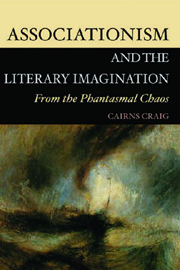Book contents
- Frontmatter
- Contents
- Acknowledgments
- Abbreviations
- Introduction: A Chain of Associations
- 1 ‘Kant has not answered Hume’: Hume, Coleridge and the Romantic Imagination
- 2 Signs of Mind and the Return of the Native: Wordsworth to Yeats
- 3 Strange Attractors and the Conversible World: Hume, Sterne, Dickens
- 4 The Mythic Method and the Foundations of Modern Literary Criticism
- 5 Chaos and Conversation: Pater, Joyce, Woolf
- 6 The Lyrical Epic and the Singularity of Literature
- Bibliography
- Index
1 - ‘Kant has not answered Hume’: Hume, Coleridge and the Romantic Imagination
Published online by Cambridge University Press: 12 September 2012
- Frontmatter
- Contents
- Acknowledgments
- Abbreviations
- Introduction: A Chain of Associations
- 1 ‘Kant has not answered Hume’: Hume, Coleridge and the Romantic Imagination
- 2 Signs of Mind and the Return of the Native: Wordsworth to Yeats
- 3 Strange Attractors and the Conversible World: Hume, Sterne, Dickens
- 4 The Mythic Method and the Foundations of Modern Literary Criticism
- 5 Chaos and Conversation: Pater, Joyce, Woolf
- 6 The Lyrical Epic and the Singularity of Literature
- Bibliography
- Index
Summary
‘For my own part’, Joseph Priestley wrote in Institutes of Natural and Revealed Religion (1772), ‘I do not hesitate to rank Hartley's Observations on Man among the greatest efforts of human genius’. Indeed, considering ‘the great importance’ of its object, Priestley had come to the conclusion by the time of the second edition that Observations was ‘without exception, the most valuable production of the mind of man’. The young Samuel Taylor Coleridge agreed: he looked forward in ‘Religious Musings’ to a time when the soul, attracted and absorbed by ‘perfect Love’, would attain to an ‘exclusive consciousness of God’ – as ‘demonstrated by Hartley’. By 1794 he was able to assert that ‘I am a compleat Necessitarian — and understand the subject well almost as Hartley himself — but I go farther than Hartley and believe the corporeality of thought — namely that it is motion’. Hartley was, for Coleridge, the intellectual underpinning for the revolutionary and millenarian expectations of the early 1790s when he hoped to escape to America in order to create an ‘experiment of human Perfectibility on the banks of the Susquahanna; where our little Society, in its second generation, was to have combined the innocence of the patriarchal Age with the knowledge and genuine refinements of European culture’. A year later, he is using Hartley's conception of ‘vibrations’ as the ‘miniatures’ of our experience to assert the moral superiority of country over town: ‘The pleasures, which we receive from rural beauties, are of little Consequence compared with the Moral Effect of these pleasures – beholding constantly the Best possible, we at last become ourselves the best possible.
- Type
- Chapter
- Information
- Associationism and the Literary ImaginationFrom the Phantasmal Chaos, pp. 41 - 84Publisher: Edinburgh University PressPrint publication year: 2007



